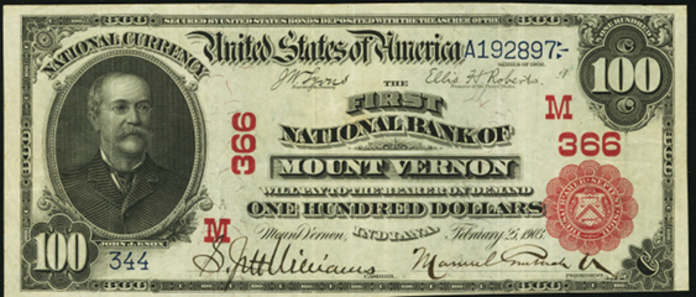One Hundred Dollar Notes › Nationals › 1902 One Hundred Dollar National Bank Notes › Illinois Charters › 1902 $100 Fairmount Illinois First National Bank
Get Value Now
| Item | Info |
|---|---|
| Series | 1902 |
| Charter | #11443 First National Bank of Fairmount, Illinois |
| Year Chartered | 1919, 288 Banks Chartered |
| City Info | Fairmount is a village in Vance Township, Vermilion County, Illinois, United States. It is part of the Danville, Illinois Metropolitan Statistical Area. The population was 640 at the 2000 census. Josiah Hunt, a railroad engineer, reportedly used inside information about the coming of the Great Western Railroad to purchase 40 acres of land along the new route to found a town. He originally named the town Salina, but this was changed because of an existing Illinois town named Saline; Francis Dougherty, an early settler, is said to have selected the name Fairmount. The town was incorporated in 1863. Source: Wikipedia |
| Similar Cities | If your note doesn't match try: 1. Fairmount, North Dakota - First National Bank 2. Fairmount, North Dakota - National Bank of Fairmount 3. Fairmount, North Carolina - First National Bank |
| Seal Varieties | Red, Blue |
| Other Info | 1. Value depends on notes known for charter, condition and market demand. |
| Neat Fact | Notes of Aldrich-Vreeland Period (1908-1915) contain inscription "Secured by United States bonds or other securities" (Friedbergs, 20th Ed. P 100) |
No Obligations Offers and Appraisals
Please submit a good photo or scan. It will be identified and evaluated. Understand there may be subtle differences between the image you see above and your note. Signatures, design, markings and note condition will determine the offer price. Notes in Uncirculated or better condition receive the best offers.
Appraisals can be estimated for wholesale and retail prices. Wholesale is what dealers typically pay. Retail is what a collector might pay. Retail is slightly higher in most cases.
Please visit this page for USA Paper Money Reference. Do not treat this page as a reference guide, it is for appraisal and acquisition purposes only.
